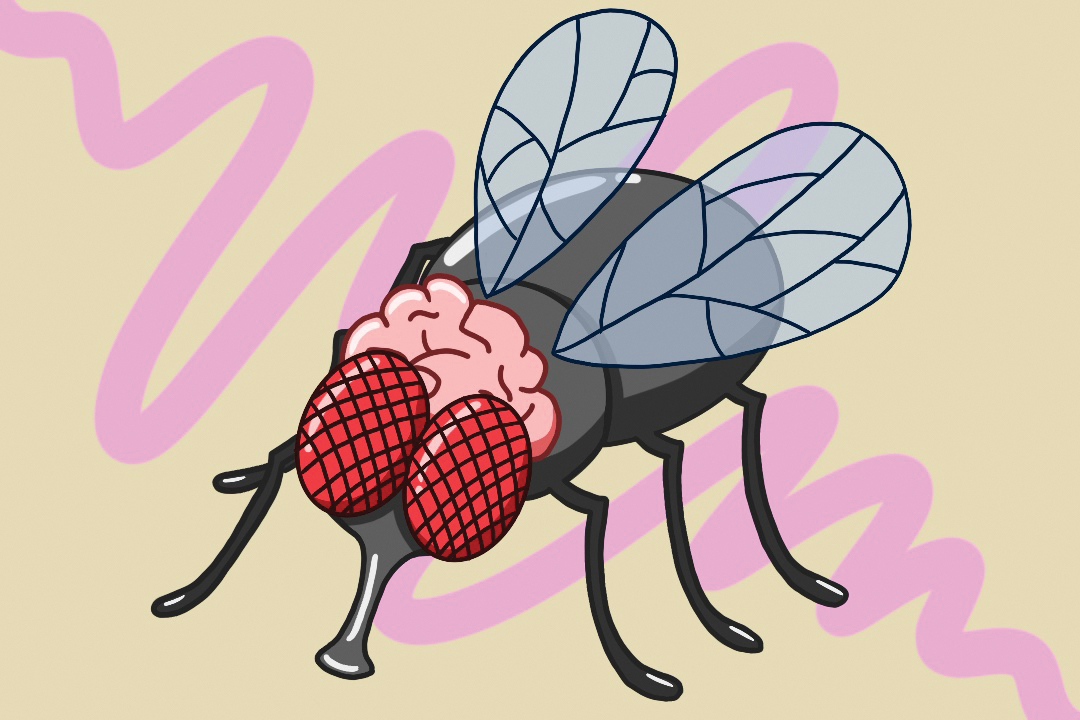There’s a lot of hype in the scientific community about different mammalian model organisms, but it seems like the general population forgets just how fascinating animals like fruit flies are. Even if they look like they’re head-empty while buzzing around your food or trash, the little guys surprisingly have many cognitive functions that parallel those found in humans — though of course at a different level. This idea is connected back to evolutionary ideas that all species come from a common ancestor.
Fruit fly brains can be useful as a model for studying how our brains work, mostly by identifying common molecular pathways for simple functions that are conserved across species. And let’s face it, though neuroscientists would love to dissect human brains on a daily basis, fruit flies are a bit more available — and probably more ethical to study.
Pavlov’s fruit flies
If you think the idea of Pavlov’s dog is a little too old-fashioned, you’ll like the idea of Pavlov’s fruit flies. On February 16, a University of California study was published where scientists successfully conditioned fruit flies using a visual stimulus to predict an incoming aversive one. This is extremely important for fruit flies to anticipate potential threats in their environment and allows them to prepare or escape as a response. Way more exciting than some dogs drooling for food, right? We’re talking fruit flies that find ways to survive, which requires an amount of heavy lifting from their brains.
What’s even more enticing is that these fruit flies were successful even with a trace conditioning procedure where the predictive visual stimulus was presented a few seconds before the presentation of the aversive stimulus.
At first, this might not seem all that different, but in this setup, the fruit flies are required to retain memory of the visual stimulus that has been presented, and use this information to predict whether the aversive stimulus is coming. Their ability to do this has several implications, all of which suggest that fruit flies have many important cognitive systems. By retaining a trace, fruit flies demonstrate that they can retain items in their working memory, recall cues from the past, and maintain attention. Just imagine the little gears that turn in fruit fly brains as they employ those cognitive functions.
A fruit fly thinks before it acts
Scientists have also been able to track the lifespan of memories in the brains of fruit flies, from their formation to their fading away. This happens primarily in the flies’ version of our sensory and motor cortex, which is called the ellipsoid body. Interestingly, the flies’ memory encoding could be distracted by another neutral stimulus, showing that flies are capable of mental multitasking. While encoding the memory of the past cue, they can simultaneously pay attention to their surroundings for new stimuli that may be presented. These abilities speak to the intricate systems that are required for survival, even in simple fruit flies. It’s fascinating that traits as cognitively complex as attention, working memory, and conscious-awareness are present in such a humble creature.
A 2014 study also shows the intricacies of the fruit fly brain. The flies in this study needed to distinguish between different concentrations of an odour, and as a result, the experimenters confirmed that fruit flies ‘think before they act.’ During the trial, they appeared to process different pieces of information before they made their decision, and scientists further noticed that the flies pondered longer when making more difficult decisions. This implies that they consider the complexity of the situation and are capable of taking the time to combine pieces of information for their decision. This kind of intelligence is characteristic of the processing seen in primates and humans.
And here’s another kicker: the fact that flies take the time to consider their decisions shows that they have impulse control. According to mathematical models, this kind of decision-making behaviour matches those displayed by primates and humans.
Goodnight, sleep tight
Another conserved function that is present in many animals is sleep. Though they seem like rowdy little guys, fruit flies actually do sleep. Much comparison has been made between the regulation of sleep in fruit flies and in mammals. In both systems, dopamine signals for wakefulness, while serotonin signals for sleep, demonstrating that sleep is controlled in similar ways in fruit flies and in mammals and thus may be modulated similarly, as well. Due to the relationship between sleep and cognition, noting these similarities can inform us of how cognitive functions in fruit flies translate to mammalian cognition. Studies about sleep are also important for us to understand neurodegenerative diseases such as Alzheimer’s.
All of this doesn’t mean that our brains are the same as fruit flies. It’s truly fascinating that an organism with such a tiny brain can still perform cognitive functions similar to our own. This perspective also emphasizes the vast capabilities of our own brain, which build on the simple structures present in fruit flies. So, next time you go and swat at one of those little pests and miss, consider the fact that you’ve been outsmarted by a fruit fly.


